
Anales de Literatura Espanola
Scope & Guideline
Illuminating the Rich Tapestry of Spanish Literature
Introduction
Aims and Scopes
- Interdisciplinary Literary Analysis:
The journal emphasizes interdisciplinary approaches, integrating insights from history, philosophy, sociology, and cultural studies to enrich the understanding of Spanish literature. - Focus on Historical Contexts:
A significant portion of the articles delve into the historical contexts of literary works, examining how social, political, and cultural factors influence literary production and reception. - Exploration of Gender and Feminism:
The journal consistently addresses themes of gender and feminism, showcasing the contributions of female authors and the representation of women in literature. - Studies on Migration and Exile:
There is a notable focus on the literature of migration and exile, reflecting on how these experiences shape identity and narrative forms in Spanish literature. - Critical Reception and Literary Networks:
The exploration of critical reception, literary networks, and cultural exchanges, particularly between Spain and other countries, is a recurring theme, highlighting the global context of Spanish literature.
Trending and Emerging
- Autofiction and Self-Representation:
The rise of autofiction as a narrative form is increasingly explored, particularly in relation to identity, memory, and the self in contemporary literature. - The Intersection of Literature and Other Media:
There is an emerging trend towards analyzing the intersections between literature and other forms of media, such as film and theater, highlighting the transmedia narratives in Spanish culture. - Focus on Diverse Narratives:
An increasing focus on diverse narratives, including those from marginalized groups, such as Afro-Spanish literature and LGBTQ+ perspectives, is evident in recent publications. - Environmental and Sociopolitical Themes:
Recent articles have begun to explore environmental literature and sociopolitical themes, reflecting the growing concern for ecological issues and social justice in literary discourse. - Digital Humanities and Literary Studies:
The application of digital humanities methodologies, including machine learning and data analysis, is a burgeoning area of interest, indicating a shift towards innovative research practices in literary studies.
Declining or Waning
- Traditional Canonical Studies:
There seems to be a waning interest in traditional studies focused solely on canonical authors and texts, as the journal increasingly prioritizes contemporary and diverse voices. - Exclusively Historical Literary Criticism:
The focus on purely historical literary criticism without interdisciplinary connections has decreased, suggesting a move towards more integrated and inclusive approaches. - Static Literary Genres:
There is a decline in papers that analyze static or fixed literary genres, as the journal embraces more fluid and hybrid forms of literature that reflect contemporary realities.
Similar Journals

REVELL-Revista de Estudos Literarios da UEMS
Celebrating Interdisciplinary Approaches to LiteratureREVELL-Revista de Estudos Literarios da UEMS is an esteemed open-access journal dedicated to the field of literary studies, published by Universidade Estadual de Mato Grosso do Sul. Since its inception in 2010, this journal has served as a crucial platform for scholars and researchers, fostering the dissemination of innovative research and critical discourse within the field of literature. The journal aims to promote rich interdisciplinary perspectives, making it an essential resource for academics, professionals, and students alike who are engaged in literary analysis and theory. Housed in the vibrant academic community of Brazil, REVELL upholds a commitment to excellence and accessibility, encouraging widespread scholarly participation and engagement across various literary topics. With an ISSN of 2179-4456, researchers can readily explore the evolving landscape of literary studies through its comprehensive and insightful publications.
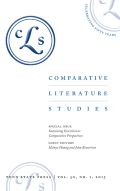
COMPARATIVE LITERATURE STUDIES
Championing Interdisciplinary Research in LiteratureComparative Literature Studies is a distinguished journal published by Penn State University Press, focusing on the diverse and evolving field of comparative literature. With an ISSN of 0010-4132 and an E-ISSN of 1528-4212, this quarterly journal has been a critical platform for scholarly dialogue and interdisciplinary research since its inception in 2000. The journal proudly ranks in the Q3 category for Cultural Studies and Q2 for Literature and Literary Theory (2023), showcasing its significant impact within these domains. Notably, it ranks #214/1106 in Literature and Literary Theory according to Scopus, placing it in the 80th percentile—highlighting its relevance and quality in the global academic landscape. Despite its traditional subscription model, the journal remains a crucial resource for researchers, professionals, and students keen on exploring the intersections of cultures, texts, and histories. By publishing cutting-edge research and critical essays, Comparative Literature Studies aims to expand the horizons of literary analysis and foster innovative scholarly exchanges.

Studia Aurea-Revista de Literatura Espanola y Teoria Literaria del Renacimiento y Siglo de Oro
Unlocking the Secrets of Spain's Literary HeritageStudia Aurea-Revista de Literatura Espanola y Teoria Literaria del Renacimiento y Siglo de Oro, published by the esteemed Universitat Autònoma de Barcelona, stands as a pivotal academic resource in the fields of Literature and History, specializing in Spanish literature from the Renaissance and the Golden Age. With its Open Access model established since 2007, this journal ensures that groundbreaking research is readily available to scholars and enthusiasts worldwide. Notably recognized for its quality, in 2023 it achieved Q1 rankings in both History and Literature and Literary Theory, reflecting its significant contribution to advancing knowledge in these domains. The journal's Scopus rankings further underscore its impact, placing it in the top 20% for literature and the top 37% for history. As it converges from 2018 to 2023, Studia Aurea continues to facilitate critical discussions, innovative research, and the exploration of literary theories, making it an essential platform for researchers, professionals, and students alike.

GERMANISCH-ROMANISCHE MONATSSCHRIFT
Fostering Innovative Perspectives in Linguistic StudiesGERMANISCH-ROMANISCHE MONATSSCHRIFT, published by UNIVERSITATSVERLAG C WINTER HEIDELBERG GMBH, is a vital academic journal dedicated to the fields of linguistics, literature, and literary theory. With its ISSN 0016-8904, this journal fosters scholarly discussions and disseminates innovative research that intersects Germanic and Romance languages and literatures. While it does not currently offer Open Access options, its contributions have positioned it within the Q4 quartile in both Linguistics and Language, and Literature and Literary Theory according to the 2023 category rankings. The journal's Scopus ranking reflects its emerging place within the academic community, situated at the 40th percentile for Literature and Literary Theory, and the 20th and 18th percentiles within Language and Linguistics, respectively. Scholars and students are encouraged to engage with this resource as it offers a platform for new perspectives that are pivotal to understanding the complex interrelations of these linguistic traditions, enriching both teaching and research initiatives.
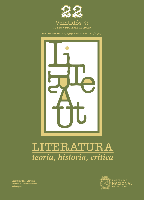
Literatura-Teoria Historia Critica
Advancing Scholarship in Literature and TheoryLiteratura-Teoria Historia Critica is a distinguished open-access journal published by UNIV NAC COLOMBIA, FAC CIENCIAS HUMANAS, that has been at the forefront of literary scholarship since its inception in 2004. With an ISSN of 0123-5931 and E-ISSN of 2256-5450, it provides an invaluable platform for researchers, professionals, and students in the field of Literature and Literary Theory. The journal's significance is underscored by its remarkable placement in the Q1 category within its field in the year 2023, as well as its Scopus ranking of #556 out of 1106 in Arts and Humanities, highlighting its influence and reach. The journal aims to foster academic discourse by publishing high-quality research articles that scrutinize literary texts, theories, and histories, facilitating a deeper understanding of literature's role in society. With a commitment to accessibility and scholarly rigor, Literatura-Teoria Historia Critica is an essential resource for those seeking to enrich their knowledge and engage with contemporary literary debates.
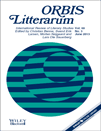
ORBIS LITTERARUM
Cultivating a Legacy of Literary ExcellenceORBIS LITTERARUM, published by Wiley, is a prestigious journal in the field of Literature and Literary Theory, aiming to foster in-depth scholarly discussions and critical analyses of literary works and their theoretical underpinnings. With its ISSN 0105-7510 and E-ISSN 1600-0730, the journal presents a rich legacy that spans several decades, having converged its publishing efforts from 1943 to 1950 and from 1954 to the present day, thus ensuring a continuity of discourse in the literary field. Recognized for its high quality, ORBIS LITTERARUM is ranked in the Q2 quartile of literature disciplines as per the 2023 metrics, placing it within the top 26% of its category and earning a favorable position in the Scopus Rankings with a percentile of 74 in the arts and humanities. Researchers, professionals, and students alike are encouraged to contribute to this esteemed journal to engage with contemporary literary debates and to influence future scholarship in literature, enhancing understanding of texts across cultures and epochs.
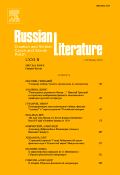
RUSSIAN LITERATURE
Unveiling the Complexity of Russian Literary TheoryRUSSIAN LITERATURE is a premier academic journal published by ELSEVIER, dedicated to advancing the study of Russian literary traditions, critical theory, and cultural contexts. With an ISSN of 0304-3479 and an E-ISSN of 1878-3678, this journal has firmly established itself as a vital resource in the field, achieving a commendable Q1 ranking in Literature and Literary Theory as of 2023. The journal benefits from a strong impact factor and ranks #178 out of 1106 in the Scopus database, placing it in the 83rd percentile of arts and humanities research. RUSSIAN LITERATURE covers an extensive timeline, converging years from 1971 to 1974 and from 1976 to 2023, reflecting its rich academic lineage. Although not an open-access publication, the journal remains influential among scholars, professionals, and students seeking in-depth analyses and critical insights into Russian literature and literary theory. Its commitment to scholarly rigor makes it an essential read for anyone engaging with the complexities of literary studies.
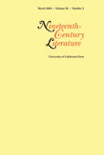
NINETEENTH-CENTURY LITERATURE
Challenging Conventional Narratives in Literary ScholarshipNineteenth-Century Literature, published by University of California Press, stands as a vital resource for scholars and enthusiasts of literature and literary theory. With an ISSN of 0891-9356, this esteemed journal explores the multifaceted dimensions of 19th-century literary works, offering critical analyses and innovative perspectives that advance the discourse in this pivotal era of literature. It holds an impressive ranking of Q3 in the Literature and Literary Theory category, with a Scopus rank of #417 out of 1106, placing it in the 62nd percentile globally. The journal, which has been disseminating knowledge since 1986 and will continue through 2024, is committed to publishing high-quality research that challenges conventional interpretations and engages with contemporary literary debates. Although it currently does not offer open access, its comprehensive scope and rigorous scholarship make it an essential platform for academics aiming to deepen their understanding of 19th-century literature.

Perinola-Revista de Investigacion Quevediana
Diving into the Rich Tapestry of Literary ThemesPerinola-Revista de Investigacion Quevediana is a prestigious academic journal dedicated to the exploration and analysis of literature and literary theory. Published by the Universidad de Navarra, Servicio Publicaciones, this journal operates within a vibrant scholarly environment in Spain, fostering critical dialogue and innovative research in the field. With its Q1 ranking in Literature and Literary Theory as of 2023 and a solid position in the Scopus rankings (Rank #410 out of 1106, 62nd percentile), Perinola consistently disseminates high-quality research that engages both seasoned scholars and emerging voices in the discipline. The journal's scope encompasses a variety of literary themes, making it an essential resource for those invested in the nuances of literary study. As an open-access publication, it ensures that groundbreaking scholarship is accessible to a global audience, reinforcing its mission to contribute significantly to the academic community from 2011 through 2024 and beyond.
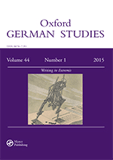
OXFORD GERMAN STUDIES
Bridging Historical Contexts with Contemporary InsightsOXFORD GERMAN STUDIES, published by Routledge Journals, Taylor & Francis Ltd, is an esteemed academic journal dedicated to the exploration and scholarly examination of German literature and linguistics. With an ISSN of 0078-7191 and E-ISSN of 1745-9214, this journal has been in circulation since 1966, offering researchers a unique platform for critical discourse, innovative research, and interdisciplinary dialogue. It holds a significant position in the academic landscape, being categorized in the Q4 quartile for Linguistics and Language and Q3 for Literature and Literary Theory as of 2023. Despite lacking open-access options, the journal thrives in providing invaluable insights, aiming to bridge historical contexts with contemporary perspectives on German studies. It serves as an essential resource for scholars, professionals, and students eager to deepen their understanding of Germanic languages and literature. Located in Abingdon, United Kingdom, the journal continues to uphold its mission of advancing knowledge and fostering scholarly discussions in the rich field of German studies.